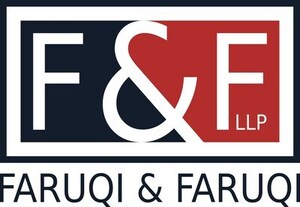NEW YORK, May 20, 2020 /PRNewswire/ -- Faruqi & Faruqi, LLP, a leading national securities law firm, reminds investors in AnaptysBio, Inc. ("Anaptys" or the "Company") of the May 26, 2020 deadline to seek the role of lead plaintiff in a federal securities class action that has been filed against the Company.
If you invested in AnaptysBio stock or options between October 10, 2017 and November 7, 2019 and would like to discuss your legal rights, click here: www.faruqilaw.com/ANAB. There is no cost or obligation to you.
You can also contact us by calling Richard Gonnello toll free at 877-247-4292 or at 212-983-9330 or by sending an e-mail to [email protected].
CONTACT:
FARUQI & FARUQI, LLP
685 Third Avenue, 26th Floor
New York, NY 10017
Attn: Richard Gonnello, Esq.
[email protected]
Telephone: (877) 247-4292 or (212) 983-9330
The lawsuit has been filed in the U.S. District Court for the Southern District of New York on behalf of all those who purchased Anaptys common stock between October 10, 2017 and November 7, 2019 (the "Class Period"). The case, City of Hallandale Beach Police Officers et al v. Anaptysbio, Inc. et al., No. 3:20-cv-00565 was filed on March 25, 2020, and has been assigned to Judge Thomas J. Whelan.
The lawsuit focuses on whether the Company and its executives violated federal securities laws by making false and misleading statements regarding the purported efficacy of etokimab, and by touting data from the Company's Phase 2a trial in peanut allergies as showing a "remarkable efficacy result" and describing the drug as having a "pretty profound efficacy" in its treatment of patients with atopic dermatitis based on AnaptysBio's Phase 2a trial data for that indication.
Specifically, on March 26, 2018, after the markets closed, the Company issued a press release, which it also filed on Form 8-K with the SEC, announcing data from an interim analysis of a Phase 2a trial for etokimab in adult patients with peanut allergy. The press release reported that six of 13 patients (or 46%) improved their peanut tolerance to a cumulative 500mg at day 14 after a single dose of etokimab compared to zero of three patients (or 0%) dosed with placebo. Based on the "positive" data from the study, the Company announced its plans to continue development of etokimab in a multi-dose Phase 2b trial in moderate-to-severe baseline peanut allergy patients.
Later that day, however, an analyst from RBC Capital Markets issued a report questioning the reliability of the Company's Phase 2a peanut allergy data. The report stated that "[etokimab's] response rate in an [intent-to-treat] population does not appear to be meaningfully differentiated" relative to the placebo. Specifically, the report explained that since AnaptysBio excluded two patients from each arm of the trial due to having mild symptoms, the difference between the etokimab-treated arm and the placebo arm was only approximately 7% on a 500mg tolerated cumulative dose intent-to-treat responder analysis basis—significantly less than the 46% response rate of etokimab-dosed patients over placebo-dosed patients the Company reported from its subgroup analysis. When considering the patients the Company excluded from its trial data analysis, seven of 15 patients (or 47%) improved their peanut tolerance to a cumulative 500mg at day 14 after a single dose of etokimab compared to two of five patients (or 40%) dosed with placebo.
On this news, the Company's stock price fell from $113.83 per share on March 26, 2018 to $107.52 per share on March 27, 2018: a $5.31 or 5.54% drop.
Then, on June 21, 2019, an analyst from Credit Suisse issued a report that questioned the veracity of the Company's Phase 2a atopic dermatitis data because of patients' use of topical corticosteroids as a rescue therapy during the study.
On this news, the Company's stock price fell from $67.02 per share on June 20, 2019 to $59.24 per share on June 21, 2019: a $7.78 or 11.61% drop.
Finally, on November 8, 2019, the Company announced "very disappoint[ing]" data from its ATLAS trial, a Phase 2b multi-dose study which evaluated the efficacy of etokimab in approximately 300 patients with moderate-tosevere atopic dermatitis. Specifically, AnaptysBio revealed that each of the etokimab dosing arms "failed to meet the primary endpoint of the trial, which was demonstration of statistically greater improvement in the Eczema Area and Severity Index (EASI) relative placebo at week 16." The Company also revealed that, as a result of this data, it had postponed the initiation of its Phase 2b etokimab clinical trial in asthma.
On this news, the Company's stock price fell from $36.16 per share on November 7, 2019 to $10.18 per share on November 8, 2019: a $25.98 or 71.72% drop.
The court-appointed lead plaintiff is the investor with the largest financial interest in the relief sought by the class who is adequate and typical of class members who directs and oversees the litigation on behalf of the putative class. Any member of the putative class may move the Court to serve as lead plaintiff through counsel of their choice, or may choose to do nothing and remain an absent class member. Your ability to share in any recovery is not affected by the decision to serve as a lead plaintiff or not.
Faruqi & Faruqi, LLP also encourages anyone with information regarding AnaptysBio's conduct to contact the firm, including whistleblowers, former employees, shareholders and others.
Attorney Advertising. The law firm responsible for this advertisement is Faruqi & Faruqi, LLP (www.faruqilaw.com). Prior results do not guarantee or predict a similar outcome with respect to any future matter. We welcome the opportunity to discuss your particular case. All communications will be treated in a confidential manner.
SOURCE Faruqi & Faruqi, LLP

Related Links
WANT YOUR COMPANY'S NEWS FEATURED ON PRNEWSWIRE.COM?
Newsrooms &
Influencers
Digital Media
Outlets
Journalists
Opted In

Share this article